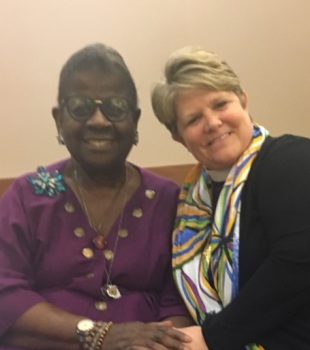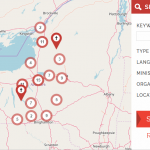image: Dr. Catherine Meeks, director of the Absalom Jones Center for Racial Healing in Atlanta, addresses the people of the Diocese of Central New York at our 2018 Ministry Fair. Photo: Charlie Crowther.
by the Rev. Peter Williams. Fr. Williams is Vicar of Ephaphtha Mission Chapel of the Deaf in the Diocese and Rector of Grace & Holy Spirit Church, an Episcopal/Lutheran congregation in Cortland. He also serves on the Antiracism Committee of the Diocese.
On Saturday, May 12th, people of the Diocese of Central New York gathered at the Holiday Inn Convention Center in Liverpool. The keynote speaker for the day was Dr. Catherine Meeks of Atlanta, Georgia. She is a nationally recognized voice for healing racial and other divisions in our nation.
She started her powerfully spiritual reflection with a poem by John O’Donohue (1956–2008), an Irish writer, priest, and philosopher. The poem included these words:
May I have the courage today
To live the life that I would love,
To postpone my dream no longer
But do at last what I came here for
And waste my heart on fear no more.
Dr. Meeks encouraged us not to get stuck in our lives, or become so discouraged by the problems of the world, that we end up doing nothing to work for change. We need to face ourselves and come to know our real selves, if we are to face the world, and call for real change.
Unfortunately, people around the world, including Americans, have refused to see the reality that there is but one God, and we are all children of that one God. Instead, we have repeatedly held to the indefensible premise that the group we belong to is superior to others, and others are less than us. “We all have our own list of people we think God does not love,” Dr. Meeks said, and she encouraged us to go beyond that limited view of humanity.

Dr. Catherine Meeks with Bishop DeDe Duncan-Probe
Dr. Meeks grew up in rural Arkansas, the daughter of a sharecropper father. She explained that the system of sharecropping in the deep South was little better than slavery. Her father was illiterate, and from a young age, his daughter had to read for him, and even assist him in signing legal papers. Her mother struggled to complete an education, in poverty, while raising her children, and after many years, she succeeded.
In the midst of this, young Catherine began to believe in all the possibilities God dreamed for her. She recalled often sitting at dawn by the doorway of her family home, and reflecting on what life was all about. She encouraged all of us today to look into our inner selves, and find the Spirit calling there, working on our selves so we can truly change. Only then can we go to the world outside and do what needs to be done there. The principal task is for us to deconstruct the oppression in a world that still does not see all of us as one family.
Dr. Meeks reminded us that this is not easy work. We will fail at times, but we must not give up.
We will not always see the fruits of our labor, and sometimes a seed we sow now will not grow abundantly until we are gone. But we must continue the work. We are doing this work because we are called by God to do this. As the poet said—“postpone your dream no longer—we should waste our hearts on fear no more.”
In the afternoon, Dr. Meeks also presented a workshop for a portion of the attendees. She discussed the ongoing racial tensions in America, and her own children dealing with those tensions. After the racist gun attack and slaughter at Mother Emanuel Church in Charleston, South Carolina, one of her sons said, “It is so hard to be black in America.” She shared how she and her family have faced racial bias through the years, and the damage done by “micro-aggressions”—subtle expressions of discomfort, prejudice or hatred. Black Americans and other groups deal with this daily, and it can wear one down. Often these aggressions are so small, they almost escape notice. But when frequently repeated, they burden us. When we are able, we need to stand up and confront them.
There is never any reason to denigrate another human being. And this is what we have to teach. It is non-negotiable.
“There is never any reason to denigrate another human being,” Dr. Meeks said, “And this is what we have to teach. It is non-negotiable.” This can often be done in ways that are strong, but gentle. We do not need to fuel a heated argument, but we can try to softly educate people on the reality of our shared humanity. Lest we wish to escape all of this discomfort, and ignore the divisions in our world, Dr. Meeks quoted Rabbi Heschel, who said, “Some of us are guilty of some very bad things, but ALL of us are responsible.”
ALL of us are responsible.
We cannot sit by passively while others suffer.
At the end of the afternoon session, Dr. Meeks shared a story to illustrate why she stays in the work in her retirement years. She was in the Atlanta airport recently. An African American father and his young son were walking through the airport. The son, perhaps about ten years old, seemed happy and confident in the world and in himself as he walked with his father to their gate. “I want him to grow up without losing that,” Dr. Meeks said, “that is why it is worth it to me to keep doing this work.”

